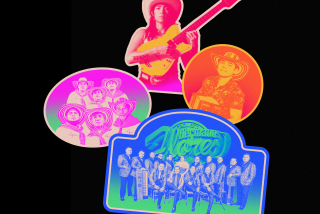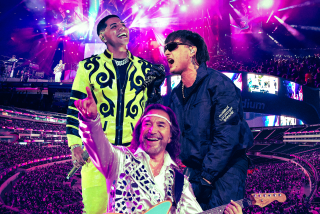Salsa Veterans Still Know How to Toss a Good Party
- Share via
Like the history of salsa itself, Saturday’s much anticipated reunion concert at the Hollywood Palladium by the group formerly known as the Fania All-Stars was equal parts splendor, frustration and bittersweet reflection.
Splendor, because the outfit was able to miraculously ignite the same overwhelming musicality that made it the most formidable band in the genre throughout the ‘70s and part of the ‘80s.
Frustration, because the mediocre sound mix dampened the spirit of the evening.
Bittersweet reflection, because the Fania All-Stars are no longer recording new material and there hasn’t been a group in the field of tropical music to equal its warmth and creativity since it disbanded in the mid-’80s.
Created in 1964 by musician Johnny Pacheco and impresario Jerry Masucci, the New York-based Fania record label is for salsa what Motown was for R&B.; It was an epic conglomerate of talent, bringing together artists such as Ruben Blades, Tito Puente, Celia Cruz and Eddie Palmieri. The Fania All-Stars were conceived as a group whose every member was a superstar.
The musicians who played Saturday (they cannot use the Fania moniker for legal reasons) almost fulfilled the original promise. A mean-spirited critic would argue that the most talented performers of the bunch have gone on to better things. Blades, Cruz and Willie Colon have transcended their Fania status. Hector Lavoe is deceased. Conguero Ray Barretto and pianist Larry Harlow weren’t invited because of personality issues, according to the concert’s organizer.
The remaining members still formed a solid enough cluster of talent to spark a dancing frenzy in the crowd of about 1,500. Singers Ismael Miranda, Adalberto Santiago, Ismael Quintana, Pete “Conde” Rodriguez and Hector Casanova are no superstars, but their collective presence was electrifying. Similarly, it doesn’t happen every day that you get to see percussionist Roberto Roena, trombonist Jimmy Bosch, tres player Yomo Toro and pianist Papo Lucca as guest players rather than bandleaders.
Interestingly, it was Lucca’s piano that defined the evening. With eyes half-closed, the diminutive musician delivered a series of superlative solos remarkable for their restraint and fluidity.
The leader of the Puerto Rican group Sonora Poncen~a, Lucca might be the most tasteful pianist in Afro-Cuban music today, continuing a legacy of elegance created in the ‘50s by Cuba’s Peruchin.
Most of the two-hour show was spent on individual performances by the singers. Quintana revisited the Palmieri originals “Puerto Rico” and “Adoracion.” Rodriguez offered a rollicking version of his hit “Meneame la Cuna,” while Miranda’s “Es Tarde Ya” was enriched by a thunderous Bosch trombone solo.
But the evening’s high point was a joyful version of “Quitate Tu,” a hummable routine where the singers take turns improvising and bragging about their vocal talents. It sounded as tight as in the 1974 Fania live album, with Pacheco offering an improv about avocados, and Toro throwing himself on the floor while the singers feigned concern and tried to lift him back up.
The group has always been known for the squabbles among its members. Saturday, as percussionist Roena took some extra time to showcase his dancing chops at the end of the evening, everybody seemed happy to indulge him, their faces beaming with utter contentment. It made for a Hollywood sort of ending to the band’s lengthy saga: the remaining members dancing the night away, considering themselves lucky just to be there playing one more song.
More to Read
The biggest entertainment stories
Get our big stories about Hollywood, film, television, music, arts, culture and more right in your inbox as soon as they publish.
You may occasionally receive promotional content from the Los Angeles Times.










